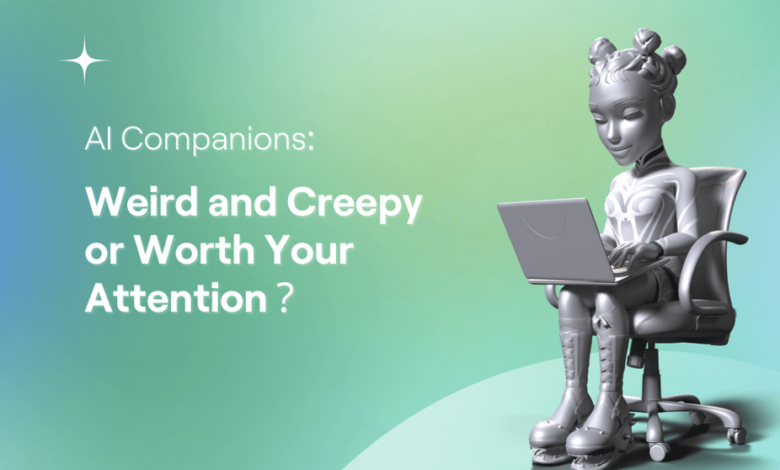
AI companions—also affectionately known as AI friends—are swiftly transitioning from futuristic fantasy to everyday reality. Apps, games, and digital worlds powered by generative AI are increasingly integrating AI companions, designed to interact with humans in deeply personalized ways. At Genies, we’ve spent years building avatars and avatar tech, so the rise of AI companions is near and dear to our hearts as we believe any AI companion or bot will need representation through an avatar.
The Weird Side of AI Companions
Let’s start with the obvious: AI companions can feel weird. Conversations with AI often lead users down surreal or unexpected paths. Whether it’s an AI friend offering oddly existential advice, misunderstanding nuanced human emotions, or abruptly pivoting from empathy to enthusiasm in awkward ways, these quirks highlight how AI is still evolving.
For instance, Replika, one of the earliest AI companions, has faced scrutiny due to overly intimate and sometimes unpredictable interactions, showcasing how AI can inadvertently cross emotional boundaries if not carefully managed. Similarly, OpenAI’s GPT-based companions often demonstrate impressive creativity but can veer into nonsensical or excessively imaginative territory, leaving users amused but occasionally bewildered.
AI companions might also unintentionally reinforce our biases or mirror our perspectives, creating an echo-chamber effect rather than challenging or enriching our viewpoints. There’s also the existential unease of forming emotional bonds with algorithms instead of people—raising uncomfortable questions about authenticity and genuine connection. Additionally, over time, users become increasingly aware that they’re interacting with an AI rather than a human. No matter how authentic the AI may seem, there’s an intrinsic awareness that this entity is simply not real. This will be a challenge for the industry as the suspension of disbelief will be vital for any AI companion to succeed long term.
But Here’s Why AI Companions Are Valuable
Despite these challenges, AI companions can offer substantial value and potential. As our time online continues to grow, an AI companion capable of personalized, empathetic, and contextually aware conversations can significantly enrich our online experiences. Over time, this heightened awareness will lead to more agentic actions and deeper engagement.
For younger generations—particularly Gen Z and Gen Alpha—AI friends serve as safe spaces to explore identities, interests, and complex feelings without judgment. They’re accessible around-the-clock companions for advice, education, insights, and entertainment. In gaming and digital environments AI companions can significantly enhance immersion, storytelling, and emotional resonance. When AI avatars embody nuanced, culturally relevant personalities and respond intelligently to user-generated interactions, the result is an engaging, authentic experience.
Take, for example, Amazon’s evolution of Alexa, which now includes enhanced conversational capabilities through generative AI, allowing for more natural, context-aware conversations. OpenAI’s customizable GPTs demonstrate immense versatility—from educational assistants guiding personalized learning to creative co-writers sparking ideas for artists. On the hardware side, AI companions like Omi and Friend showcase AI’s potential to interact with users in the physical world, blending digital personalities with tangible presence. Moreover, specialized companions like Tolan offer tailored mental health support, demonstrating AI’s potential to deliver accessible therapeutic assistance.
The Challenge and Opportunity in Consumer AI
Today, platforms like ChatGPT, Perplexity, Claude, Grok, and Deepseek may seem interchangeable to the average consumer. The user experience has remained relatively stagnant and generic over the past two years, contributing to a commoditization of conversational AI where users rarely develop meaningful connections with any specific AI companion.
Additionally, most consumers, particularly Gen Alpha and Gen Z, utilize only a fraction of what LLMs offer—primarily for generalized information or homework assistance—rather than personalized insights, tailored recommendations, or deeper emotional engagement. Excessive prompting requirements and non-intuitive interfaces further limit this deeper interaction potential.
Final Thoughts
I believe the future of AI companions lies not just in conversation but in deeply personalized, immersive digital experiences. Imagine an AI companion that doesn’t just talk but listens, learns, and remembers interactions, preferences, and experiences, transforming casual engagements into personalized connections that can chat, interact, and even play games with you. When AI companions share your context, interests, and emotions, they unlock richer insights, tailored suggestions, and meaningful experiences. Whether helping navigate a challenging moment, suggesting new creative ideas, simply providing supportive companionship, or playing and interacting through game experiences, these AI entities become trusted and valuable friends.
AI companions might feel strange or surreal now, but their promise is undeniable. As consumer AI reaches mainstream adoption, companies and creators that thoughtfully balance innovation with empathy—and strangeness with value—will set the standard. At Genies, we’re committed to guiding this future, ensuring that AI companions enhance, enrich, and ethically engage users, ultimately leading the evolution of immersive experiences and meaningful AI-human connections.




